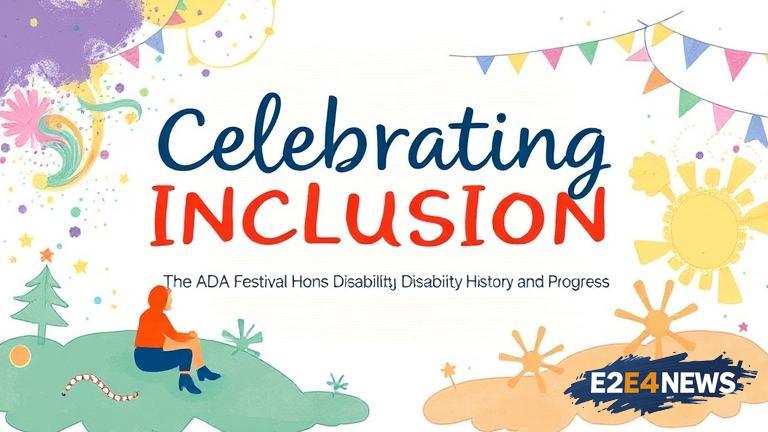The ADA Festival is an annual celebration that takes place to honor the history and progress of disability rights in the United States. This year’s festival marked the 32nd anniversary of the Americans with Disabilities Act (ADA), a landmark legislation that has paved the way for greater inclusion and accessibility for people with disabilities. The festival featured a range of events and activities, including panel discussions, workshops, and performances, all aimed at promoting equality and accessibility for all. The ADA has had a profound impact on the lives of people with disabilities, providing them with greater access to education, employment, and healthcare. Despite the progress made, there is still much work to be done to achieve full inclusion and accessibility. The festival provided a platform for people with disabilities to share their stories and experiences, highlighting the challenges they face and the successes they have achieved. It also brought together disability advocates, policymakers, and community leaders to discuss the latest developments and innovations in disability rights. The festival’s theme, ‘Celebrating Inclusion,’ reflected the importance of creating a society that values and includes people of all abilities. The events and activities were designed to be accessible and inclusive, with accommodations such as sign language interpretation, audio descriptions, and wheelchair accessibility. The festival also featured a range of exhibits and displays, showcasing the latest technologies and innovations in disability accessibility. One of the highlights of the festival was a keynote address by a prominent disability advocate, who spoke about the importance of intersectionality and inclusivity in the disability rights movement. The speaker emphasized the need for greater representation and inclusion of people with disabilities in all aspects of society, including education, employment, and government. The festival also included a range of performances, including music, dance, and theater, all featuring artists with disabilities. These performances showcased the talents and abilities of people with disabilities, challenging stereotypes and promoting greater understanding and acceptance. In addition to the events and activities, the festival also provided a range of resources and information for people with disabilities, including information on disability benefits, accessibility services, and advocacy organizations. The festival’s organizers also announced a range of new initiatives and partnerships, aimed at promoting greater inclusion and accessibility in the community. These initiatives included a new accessibility program, which will provide training and resources for businesses and organizations to improve their accessibility. The festival was attended by thousands of people, including people with disabilities, family members, and advocates. The event was widely covered in the media, with many outlets highlighting the importance of the ADA and the need for greater inclusion and accessibility. Overall, the ADA Festival was a celebration of the progress made in disability rights, while also acknowledging the challenges that still need to be addressed. It provided a platform for people with disabilities to share their stories and experiences, and for advocates and policymakers to discuss the latest developments and innovations in disability rights. The festival’s theme of ‘Celebrating Inclusion’ reflected the importance of creating a society that values and includes people of all abilities. As the disability rights movement continues to evolve and grow, events like the ADA Festival play an important role in promoting greater understanding, acceptance, and inclusion. The festival’s impact will be felt long after the event is over, as it has helped to raise awareness and promote greater inclusion and accessibility in the community. The ADA Festival is an important reminder of the need for ongoing advocacy and activism to achieve full inclusion and accessibility for people with disabilities. By celebrating the history and progress of disability rights, the festival has helped to inspire a new generation of advocates and activists to continue the fight for equality and accessibility. The festival’s legacy will continue to be felt in the years to come, as it has helped to promote greater understanding, acceptance, and inclusion of people with disabilities.
